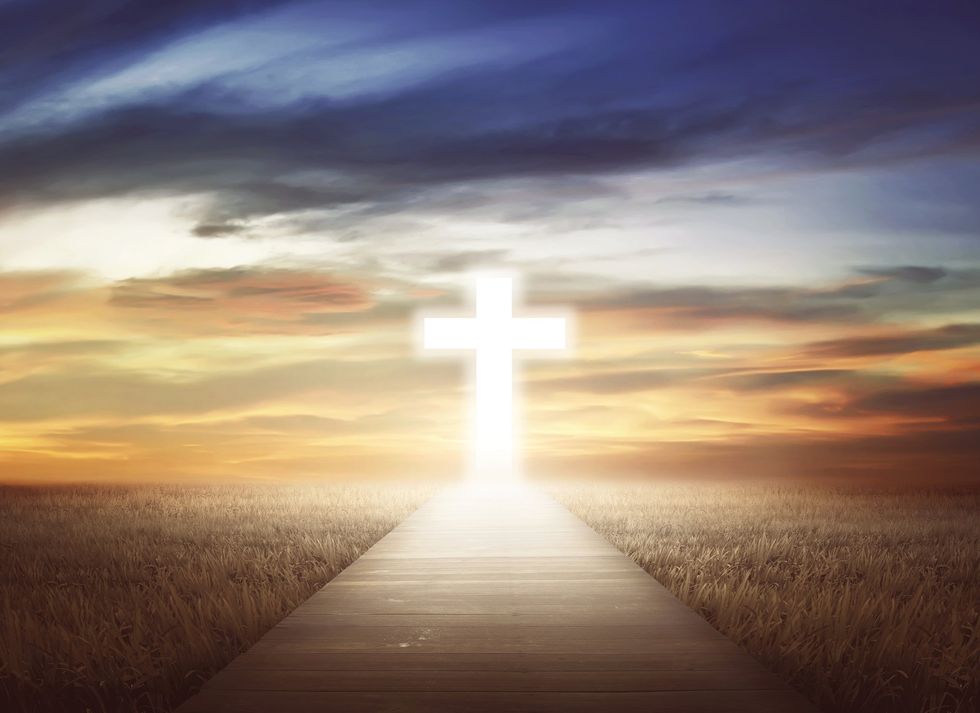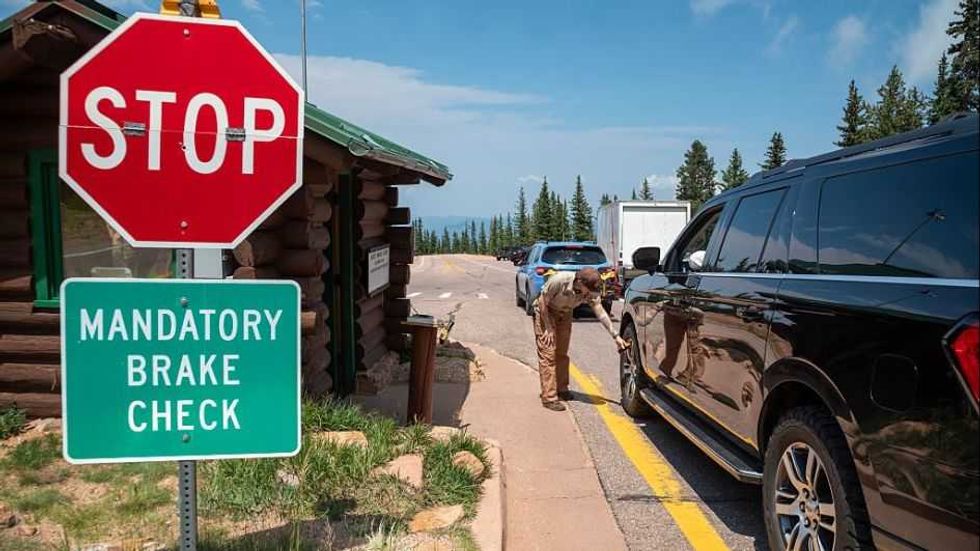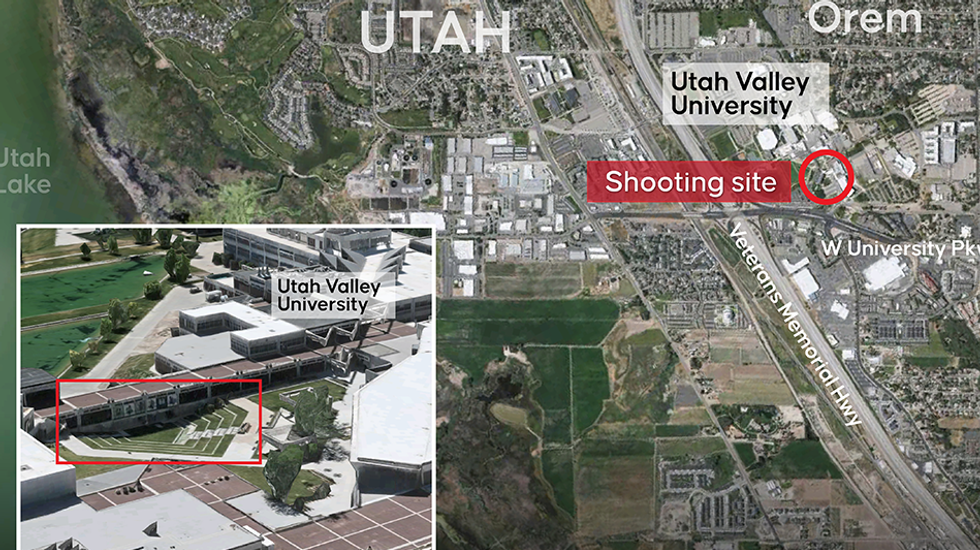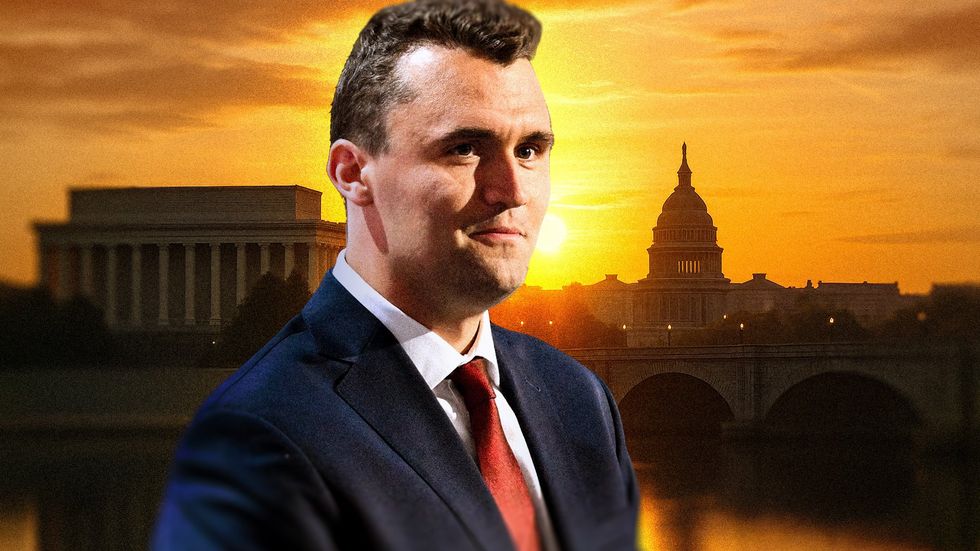Why Christianity is a pilgrimage — not a vacation


Last summer, I toured the set of "The Chosen," sprawling across Camp Hoblitzelle in Midlothian, Texas, not far from Mercury Studios, where Blaze Media calls home.
My parish priest came along. He said the opening blessing.
Every generation gets to choose whether or not to abandon Christianity forever.
None of the cast or crew were there, so we got to see the set in its most humble form, its bare life.
We stood in a first-century village built from scratch on Salvation Army land — a gift, Derral Eves told me, both for the show and for Bible education.
Eves is the executive producer and marketing mind behind "The Chosen," the global television phenomenon that has drawn in millions of viewers and pushed Christian storytelling into new creative territory.
“This generation probably isn’t going to open a Bible,” Eves told us. “But if they see something that speaks to them — they might. And once they do, Scripture preaches. That’s where we want them to go.”
The goal, he explained, is not only to present Christ authentically but to show people who had real problems and real lives and how those lives were upended by love.
“For years, we’ve only talked about the divine side of Jesus,” he said. “But he had a mom. He had friends. He had people around him whose lives were changed forever.”
Technologic
"The Chosen" has taken Christ’s pilgrimage into the future.
God’s loving grace reaches us in every way. Especially technology. Every time, it affirms a truth of Christianity: We believe in the one true living God, the font of all newness.
We have to remain technologic pilgrims: to use our tools but never be used by them.
As I pointed out in my article “God bless the meme evangelists,” every generation gets to choose whether or not to abandon Christianity forever. But no generation has. Instead, believers have multiplied, billions of disciples, constantly renewed by our life of constant exile.
Testimony
I wasn’t always Catholic. Before that, I was a kind of street Baptist. Nondenominational — in the later years, several congregants celebrated worship music with color guard and hula-hoops. One lady even strutted around with a snake on her shoulders.
The church, Agape Metro, was named after the Greek word for love, the essence of the pilgrim’s allegiance. It lasted five years before fracturing into several other churches. None seemed as guided by inspiration as Agape.
We held services anywhere: the playground of a downtrodden park, the rented hall of the community center, the high school gymnasium.
We eventually migrated to a home of sorts, the creaky upstairs of a decommissioned firehouse, easily a century old. Wobbly, dank, bare.
But this poverty suited the focus of our mission. Ministry took place on potholed streets, in battered neighborhoods, full of half-wild dogs and single mothers, boisterous with drunks and criminals.
Each of us contained the temple of the Holy Spirit. Architecture was spiritual. Anything else was vain and fleeting.
We were called to navigate the war zone of human life like a lost tribe, roaming and bare. I was baptized in a lake. I still drive by it sometimes. I can still feel my face rising from muddy water, can still see the spangles of light as I broke through the glass of the surface, brand-new, redeemed, born again.
Starship eyes, lit up with fire.
Anxiety of the pilgrim
Dietrich Bonhoeffer was stuck in a cell in a Gestapo prison, with a jingle stuck in his head: “Let pass, dear brothers, every pain; what you have missed I’ll bring again.”
In a letter, he explained: “What does this ‘I’ll bring again’ mean? It means that nothing is lost, that everything is taken up in Christ, although it is transformed, made transparent, clear, and free of all selfish desire. Christ restores all this as God originally intended it to be, without the distortion resulting from our sins.”
A few weeks later, Bonhoeffer was hanged by the Nazis. As the guards hauled him away, he announced the victory of his execution, “This is the end — for me the beginning of life."
The pilgrim belongs to God. The tourist belongs to spectacle.
Hitler had power, but not freedom — not like this. If God is with us, who can be against us? Absolutely nobody. Not the Nazis, not even Satan, and certainly not death. No darkness can overcome the flow of God’s light.
This migration is the heart of Christianity. It unlocks eternity and brings it into our world. We walk through the desert, homeless and poor, and as we collapse, we smile, because when we’re weak, we’re strong.
Birkenstocks
Fr. Vincent Lampert, an exorcist in Indianapolis, explained it to me plainly: “Jesus gave his apostles authority over unclean spirits. That’s what the Church continues.”
His power is passed down. But it’s not about spectacle or grand battles. It’s about presence.
Jesus didn’t tell us to run for office. He told us to go — two by two, with sandals on our feet. “If a town doesn’t welcome you,” he said, “dust off your feet and move on.”
And if it does? Linger. Enjoy the community. Then go again, poor banished children of Eve.
Myth-breakers
In Acts 14, Paul and Barnabas fled from one town to the next, preaching as they darted from martyrdom and tragedy. In Lystra, they healed a crippled man on the street.
The locals, caught in pagan delusion, flipped out.
They shouted, "The gods have come down to us in human form!" (Acts 14:11). They called Barnabas "Zeus" and Paul "Hermes," and they brought out oxen for sacrifice.
The apostles tore their clothes in protest: “We are mortals just like you, and we bring you good news: that you should turn from these worthless things to the living God, who made the heaven and the earth and the sea and all that is in them."
But the evil one caught up with them and spread his whispers through the crowd, a scandal that led to the stoning of Paul: The persecutors “dragged him outside the city, thinking he was dead. But after the disciples had gathered around him, he got up and went back into the city.”
Rebellion
Critics and enemies of Christianity love to conflate Christ with the gods of antiquity — as if the Christian story is just another version of ancient mythology. But this is the same error the Greeks made in Acts. They tried to fit the gospel into a pagan framework.
But there are no longer pilgrimages in the name of Venus or Mars. Their temples are ruins. Their rituals are forgotten. Meanwhile, time itself has been reshaped around the birth of Christ. His story still sends people walking.
I recently spoke with James Quiggle, who has written over 75 commentaries on Scripture and Christian doctrine. When I asked about this tendency to reshape Jesus, he pointed to the root issue: rebellion. Rebellion against God, against His values, His authority, His love.
“When people reject the true God,” Quiggle told me, “they still need to worship something. So they invent a version of Jesus that fits their rebellion — one with just enough divinity to inspire, but not enough to convict.”
They make Him manageable. A philosopher. A demigod. A temporary vessel. Something that can bless their path without calling them to leave it.
But the real Jesus doesn’t meet you halfway. He calls you to follow. To become a pilgrim. The joy of the Christian journey isn’t that we invent God — it’s that He calls us out of ourselves and into communion. The apostles followed a person, not an idea. And that’s still the offer.
The good news
The Acts of the Apostles opens with the ascension and Pentecost — explosions of glory. But the real miracle is quieter. It’s the joy. Somehow, Acts is a joyful, and exciting, book.
These men were hunted. Tortured. Killed in the most horrific ways. They could have saved themselves by denying the Resurrection. They didn’t.
Instead, they laughed. They sang hymns in prison cells. They broke bread and preached hope. Only John lived to old age, and not for lack of trying to kill him.
They knew the cross was not the end. They had seen the empty tomb. Like the good thief to Christ’s right, they looked through the smoke and saw eternity. And with their gaze facing that light, they never stopped walking.
Pilgrims and tourists
The Christian life is a pilgrimage, not a vacation. The pilgrim knows nowhere is safe except the final holy site. Pilgrims make vows, embrace discomfort, and walk toward holiness.
Tourists, by contrast, chase moments. They want stimulation, not transformation. As Byung-Chul Han puts it, they live in a “totalization of Here and Now” — a string of disconnected experiences, stripped of meaning.
The tourist performs; the pilgrim belongs.
Philosopher Giorgio Agamben once wrote that the tourist undergoes a kind of self-sacrifice — not to unite heaven and earth, but to “celebrate the destruction of all possible use.”
The pilgrim belongs to God. The tourist belongs to spectacle.
Kingdoms in conflict
From the angel’s annunciation in Luke to the agony of Gethsemane, the Gospels present a slow-motion collision between the kingdoms of men and the kingdom of God.
The kingdom of emperors versus the kingdom for pilgrims and apostles.
One is gilded, political, and violent. The other is veiled in mystery. One builds temples to power. The other sleeps in a manger, walks with lepers, dies on a tree.
First person
In Acts 16, Luke shifts. Suddenly, he’s no longer writing about the apostles. He’s with them.
“We got ready at once to leave for Macedonia,” he writes. No explanation. No apology. Just a new pronoun and the sense that we are in this together now.
By Acts 27, Luke is still there — documenting shipwrecks and storms and miracles with the intimacy of someone who lived it. The Gospel of Luke and Acts, taken together, make up 27.5% of the New Testament. Nearly a third. The Church’s story is told through a writer who wasn’t there at the beginning — but who joined when the Spirit led him into pilgrimage.
Originally Published at Daily Wire, Daily Signal, or The Blaze
What's Your Reaction?
 Like
0
Like
0
 Dislike
0
Dislike
0
 Love
0
Love
0
 Funny
0
Funny
0
 Angry
0
Angry
0
 Sad
0
Sad
0
 Wow
0
Wow
0













































































